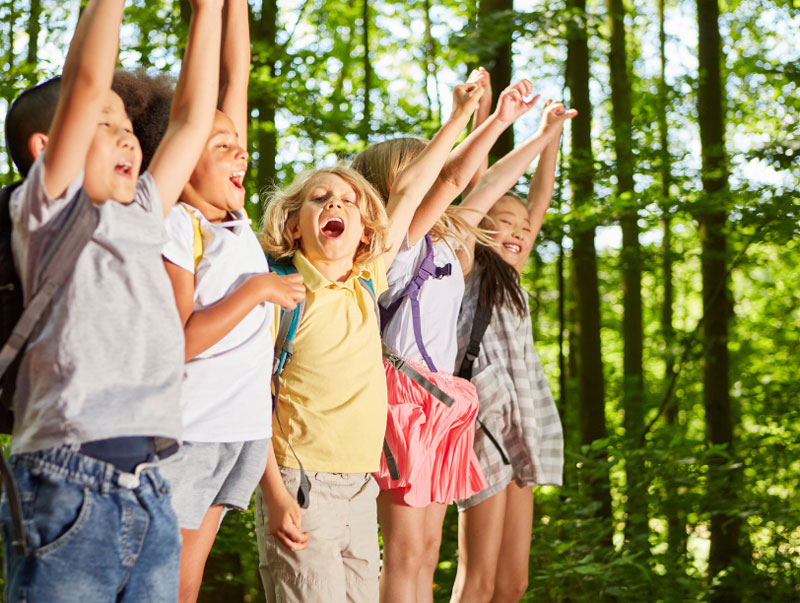Benefits of Forest Kindergarten
Forest Kindergarten Level 3 – Local Nature Play
Forest Kindergarten Level 3 – Local Nature Play provides the complete foundation for early-year practitioners who want to work in nature with groups of early-year learners.
Forest Kindergarten training is modelled on a Forest School approach and is based around child-centred learning through play in the Early Years.
With a Forest Kindergarten Level 3 Training qualification, you can take young children on frequent visits and regular play opportunities in a local, natural setting all year round, be they woodland, park or even a beach!
Children have the opportunity to become immersed in their surroundings, gain a deeper sense of connection to their local community, direct their own learning and ultimately have a greater appreciation of nature.
What are the benefits of Forest Kindergarten Sessions?
1. Enjoyment – Children who regularly learn, play and enjoy the outdoors environment are observed to feel happier and more relaxed. They can learn at their own pace, follow an interest, enjoy the fresh air, get mucky without worry – what could be better?
2. Play – the Forest Kindergarten approach supports child-centred learning through play in a real world context. It provides young children with freedom to explore and use multiple senses.
3. Nature immersion, discovery and exploration – Children have the time and space to become the ‘directors’ of their own learning. Staff take on an observation and supporting role and this empowers children to become managers of their own learning process.
4. Creates interactions with people and places where they play in their local area – As a result of these positive interactions, children learn to care for nature. Children develop a connection with the natural world which can lead to long term environmental awareness, understanding and positive action.
5. Wellbeing – promotes movement, health and well being, physical and emotional resilience, promotes ‘in the moment’ experiences and develops confidence.
6. Awareness – supports the acquisition of knowledge, skills and care for the natural world.
7. Motivation and concentration – spending time in the outdoor environment is exciting for a child. The outdoors and its constant changing state fascinates children and therefore leads to high levels of attention. Many practitioners who regularly take children to visit local spaces have noted that children are able to participate and concentrate for longer periods of time.
8. Risk benefit – regular visits with time and space, supportive adults and plenty of child led play helps to develop children’s awareness of risk as well as their confidence in managing risk. Children develop their confidence with taking risk over time and consider as a direct experience before deciding what action to take.
9. Teamwork / co-operation – children when playing and exploring outdoors can demonstrate a less competitive nature. They use the natural world in a completely different way, often becoming more imaginative with their play, developing a different rhythm and working together for a shared purpose. There is less academic pressure, less formal structure which children (and adults) really respond to.
10. The ripple effect – When children have positive experiences outdoors they will take their experiences home to share with friends and family. This will often encourage families to visit their local woodlands more frequently.
Our Forest Kindergarten Level 3 course is supported by 2 guiding principle documents developed by a UK based working group of Early Years and Outdoor Play specialists.
Forest Kindergarten Level 3 – Local Nature Play
The aim of this two-day training is to develop Early Years practitioners’ skills to enable and empower them to make regular visits to a local green space/woodland.
Key Content:
- How to prepare both yourselves as practitioners and your young children to go to a green space.
- Setting up a suitable site and setting boundaries with children.
- Preparing for risks (risk benefit model).
- Research on the benefits of playing and learning outdoors.
- Games and songs to support children with the routines of regular visits to a green space.
Date: 18th, 19th, 20th October 2022
Facilitators: Louise Hack & Lucy Collins
Location: Mill Woods, near Laughton, East Sussex. Day 3 is at Bee in the Woods Outdoor Nursery in Portslade
Time: 09.00 – 16.30
Cost: £375 for the two days
Booking: Please book via the website
Forest Kindergarten Level 3 Facilitators:
Louise Hack is a qualified teacher, Forest School Practitioner and Early Years Professional with over 20 years of experience. Over the last 20 years she has worked in various primary and infant schools in East and West Sussex taking on many different roles including Early Years lead, Specialist Early Years and Literacy leader across the county, Deputy Head and Head of School. Read more.
Lucy Collins is an Early Years Teacher with MA Early Years Education, Forest & Beach School Facilitator, Trainer, SENCO and mother. Having worked in Environmental Education for over 20 years, Lucy has seen first-hand how engagement with the natural world nurtures wellbeing, curiosity and development and is passionate about connecting communities in nature. Read more.




